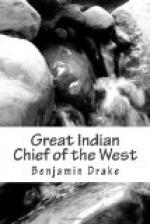Sale of whiskey to the Indians, 245.
W
Wabokieshiek, advice to British Band, 93.
Warrior’s attack on Black Hawk, 153.
Wapellar’s speech, 211.
FOOTNOTES
[1] Schoolcraft’s Travels, p. 347.
[2] Published in the Illinois Magazine under the head of “History of St. Louis.”
[3] James Hall, Esqr.
[4] Chronicles of the North American Savages, No. 4. page 53.
[5] History of the North American Indians, by James Hall, Esq.
[6] James Hall, Esq.
[7] Judge Hall.
[8] Patterson’s Life of Black Hawk, dictated by himself.
[9] See Adjutant W. W. Woodbridge’s statement.
[10] “The Book of the Indians of North America,” p. 127.
[11] This class is admirably described by the author of “Legends of the West.”
[12] See St. Louis Times of 13th April, 1833.
[13] “The Book of the Indians of North America,” by Samuel G. Drake of Boston, containing much interesting matter about the aborigines of this country, and from which we have copied several of the speeches made upon the liberation of Black Hawk.
[14] Black Hawk seems to have entertained a warm friendship for Colonel Davenport. On another occasion, speaking of this council, he said, “I here met my old friend, a great war chief, [Colonel William Davenport] whom I had known for eighteen years. He is a good and a brave chief. He always treated me well, and gave me good advice. He made a speech to me on this occasion, very different from that of the other chief. It sounded like coming from a brave.” He adds, “If our great father were to make such men our agents, he would much better subserve the interests of our people, as well as his own, than in any other way; and had the war chief alluded to, been our agent, we never should have had the difficulties with the whites which we have had.”
Those who have the pleasure of a personal acquaintance with Colonel Davenport will join in Black Hawk’s spontaneous tribute to his character as a brave, and a gentleman of humane and noble feelings.
[15] Colonel Whittlesey, of the Geological Corps of Ohio. See Hesperian for February, 1839, in which this gentleman has given valuable recollections of a tour through Wisconsin in 1832.
[16] See Traits of Indian Character, by G. Turner.
[17] See a “Discourse on the Surviving Remnant of the Indian Race in the United States,” by Job R. Tyson, Esq. of Philadelphia.



